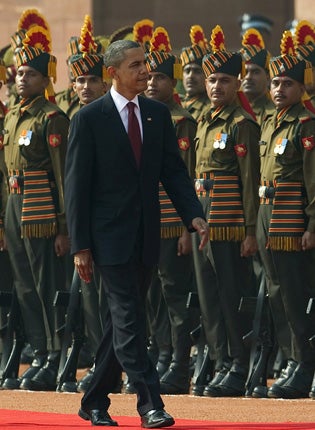Obama backs India's Security Council bid

Barack Obama has thrown his support behind India becoming a permanent member of the UN Security Council – an endorsement that underlines the world's shifting geopolitics and the role of Delhi as a possible counter-weight to mounting Chinese influence.
Speaking before the Indian parliament at the end of a three-day visit largely devoted to trade and business deals, Mr Obama drew warm cheers when he announced: "The just and sustainable international order that America seeks includes a United Nations that is efficient, effective, credible and legitimate. That is why I can say today, in the years ahead, I look forward to a reformed UN Security Council that includes India as a permanent member."
Mr Obama's comments in the parliament building where Jawaharlal Nehru, India's first prime minister, delivered his "tryst with destiny" speech, do not mean India is going to become a member of the council in the immediate future. For such a move to take place there would need to be a broader reform of the body. But his unprecedented support heartened a political establishment that has sought recognition of its growing economic power and influence. A senior aide said the president's words amounted to a "full endorsement".
The comments were seized on by Indian politicians. Jaswant Singh, a member of the opposition Bharatiya Janata Party, and a former foreign minister, said: "It was a powerful endorsement. It is very welcome. Very eloquently put."
But Mr Obama warned India that its membership of the council was not a one-sided affair. "With increased power comes increased responsibility," he said, in a portion of his speech that was less warmly applauded.
"When peaceful democratic movements are suppressed, as they have been in Burma, then the democracies of the world cannot remain silent. Faced with such gross violations of human rights, it is the responsibility of the international community, especially leaders like the United States and India, to condemn it. If I can be frank, in international fora, India has often shied away from these issues."
Mr Obama's comments were welcomed by human rights groups. Meenakshi Ganguly, India spokeswoman for Human Rights Watch, said: "It is fantastic to have the President talk about human rights in the Indian parliament, a concept that has sadly been ignored in recent years if it comes in the way of strategic interests or security."
Mr Obama is not the first leader to support security council membership for India, which earlier this year hosted Burmese junta leader, General Than Shwe for a controversial state visit. In January 2008, then UK Prime Minister Gordon Brown said he believed India should take its "rightful place". Two other permanent members, France and Russia, have also said they support such a move for India.
Mr Obama also pleased his hosts with forthright comments on the need for Pakistan to do more to act against militants operating within its borders, saying: "We will continue to insist to Pakistan's leaders that terrorist safe havens within their borders are unacceptable and that the terrorists behind the Mumbai attacks be brought to justice."
While by themselves the comments were not new, his decision to state them on Indian soil earnt him more applause.
Join our commenting forum
Join thought-provoking conversations, follow other Independent readers and see their replies
Comments
Bookmark popover
Removed from bookmarks